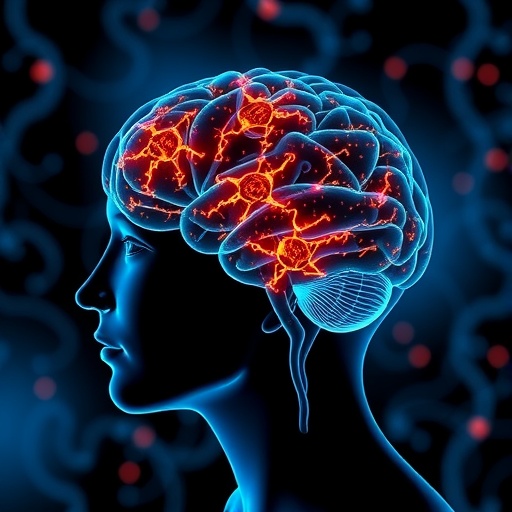A Groundbreaking Study Links Lower Brain Choline Levels to Anxiety Disorders
Recent research emerging from UC Davis Health has uncovered a striking biochemical discrepancy in the brains of individuals diagnosed with anxiety disorders: a notable reduction in the levels of choline, a vital nutrient integral to brain function. This pioneering study, published in the esteemed journal Molecular Psychiatry, leverages meta-analytic techniques to amalgamate data from 25 distinct investigations, encompassing 370 individuals with anxiety disorders and 342 without, revealing that choline concentrations are approximately 8% lower in those affected by anxiety.
Proton magnetic resonance spectroscopy, known as 1H-MRS, underpins this discovery, offering a sophisticated, non-invasive method to quantify neurometabolites — specialized chemicals active in brain metabolism. Unlike more conventional MRI scans that focus on anatomical imaging, 1H-MRS utilizes radiofrequency waves and magnetic fields to unveil the chemical composition of brain tissues, thereby detecting subtle neurochemical variations like choline, represented as “Cho” within spectroscopic data.
The research specifically identifies pronounced reductions in choline within the prefrontal cortex, a cerebral region central to executive functions including decision-making, emotional regulation, and behavioural control. This reduction in choline disrupts the homeostasis of neurotransmitters and alters membrane integrity, potentially underpinning the neurobiological substrates of anxiety. Given choline’s crucial role as a precursor to acetylcholine, and its involvement in cell membrane phospholipid synthesis, diminished availability may impair synaptic transmission and neuronal resilience.
Senior author Richard Maddock, a psychiatrist and imaging researcher, highlights the ubiquity and burden of anxiety disorders — affecting roughly 30% of adults in the United States — and emphasizes that this neurometabolic fingerprint provides the first transdiagnostic chemical signature associated with anxiety pathology. Such biochemical insights pave the way for exploring nutritional and pharmacological interventions that target brain choline levels, potentially offering adjunctive strategies alongside traditional cognitive-behavioral or pharmacotherapy approaches.
The study’s identification of an 8% reduction, while seemingly modest, is biologically significant when contextualized within the tightly regulated milieu of brain chemistry. Ongoing research is necessary to elucidate whether augmenting dietary intake of choline-rich foods or supplements can modulate this deficit and translate into measurable clinical improvements. However, experts caution against unsupervised supplementation due to the complexity of choline metabolism and potential side effects.
Choline is not synthesized sufficiently by endogenous pathways, making dietary sources paramount. It is essential for maintaining the structural and functional integrity of cell membranes and supports the synthesis of critical neurotransmitters like acetylcholine. Common dietary contributors include eggs, particularly yolks, beef liver, fish, soybeans, chicken, and milk, underscoring the importance of a balanced diet in maintaining optimum brain health.
Anxiety disorders encompass a spectrum of conditions such as generalized anxiety disorder, panic disorder, social anxiety disorder, and phobias. These disorders share common neuroanatomical correlates, including hyperactivity of the amygdala and altered prefrontal cortex function, which affect how individuals perceive and respond to environmental threats. Enhanced “fight-or-flight” activity, characterized by elevated levels of norepinephrine and other stress-related neurotransmitters, may escalate choline consumption and depletion.
The relationship between neurometabolites and clinical anxiety underscores the multifaceted pathophysiology of these disorders, involving both neurochemical imbalances and dysfunctional neural circuits. This nuanced understanding challenges current paradigms and invites interdisciplinary approaches integrating neuroimaging, psychiatry, nutrition, and molecular biology.
Lead author Jason Smucny notes that this study represents a crucial advancement in neuropsychiatric research by standardizing multiple datasets through meta-analysis, thereby enhancing statistical power and robustness of findings. This synthesis of data across anxiety subtypes also underscores the shared biochemical alterations that transcend individual diagnoses.
While the data is compelling, the translational leap to clinical practice is cautious. The specificity of choline’s role in anxiety remains to be fully characterized, and whether supplementation yields therapeutic benefit requires randomized controlled trials. Meanwhile, clinicians and patients alike are encouraged to maintain nutritional vigilance while recognizing the complexity of anxiety’s neurobiology.
In summary, this breakthrough study elucidates a biochemical hallmark of anxiety disorders—reduced cortical choline—measured via cutting-edge imaging technology. It highlights the potential for nutritional neuroscience to contribute novel insights and interventions tailored to mental health, fostering hope for more personalized and effective treatment strategies in the future.
Subject of Research: People
Article Title: Transdiagnostic reduction in cortical choline-containing compounds in anxiety disorders: a 1H-magnetic resonance spectroscopy meta-analysis
News Publication Date: 5-Sep-2025
Web References:
– https://doi.org/10.1038/s41380-025-03206-7
– https://health.ucdavis.edu/psychiatry/
– https://health.ucdavis.edu/irc/
– https://ods.od.nih.gov/factsheets/Choline-HealthProfessional/
References: DOI: 10.1038/s41380-025-03206-7 Molecular Psychiatry
Image Credits: UC Regents
Keywords: Anxiety disorders, Anxiety, Clinical psychology, Clinical psychiatry, Psychotherapy, Neurotransmitters, Neurochemistry




